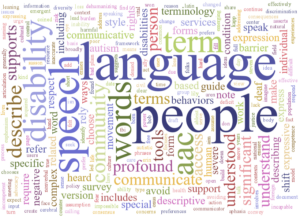CommunicationFIRST’s Quick Style Guide

This guide is a quick reference for the words CommunicationFIRST does and does not use when we talk about members of our community. Read the complete guide here, and a plain language version here. You can download a PDF version of this short version here.
We are finding our own voice, telling our own truths, and expressing our own individual and collective stories. We are naming ourselves. And we choose our words with great care.
Our decisions are guided by respect for the diversity of our community and for every person’s right to choose the words they use for themselves. We recognize that language evolves, and we commit to continuing to listen, learn, and advocate. We understand the power of language in the pursuit of justice, and we are grateful for the previous liberation movements that have paved the way for communication and linguistic justice.
The Words We Currently Use
There is no single universally-accepted term to describe our diverse community. Currently, we might use:
- people who cannot rely on speech alone to be heard and understood
- people with speech disabilities or speech-related disabilities
- people with communication access needs
- people with expressive communication disabilities
- people who cannot use speech as their primary means of expression
- people who need / rely on / require AAC *
- AAC users / people who use AAC
* We define AAC, or augmentative and alternative communication, as all forms of communication other than speech, like gestures, eye gaze, vocalizations, facial expressions, and body positioning. Language-based AAC is any form of AAC that allows the person to communicate using words, such as alphabet boards, speech-generating devices, keyboards, and human revoicers.
The Words We Currently Avoid
Nonverbal From the root verbum, or “language,” the word nonverbal assumes that someone cannot understand or use language (as opposed to speech). It also suggests this status is unchangeable. These ideas are untrue and, for many, lead to the denial of AAC.
► Instead, use: AAC user or person who needs AAC or nonspeaking (for autistic people)
Severe or profound These words are not positive. They make it harder to imagine a disabled person as a friend, ally, classmate, leader, or neighbor. They invoke feelings of fear and pity, not common humanity. Nor do they communicate what the person actually needs.
► Instead: Describe the person’s specific access needs
Disorders, impairments, or deficits Disability is a natural part of human diversity. No form of communication is wrong. Plus, all communication is two-way: it’s an act we do together, not something we have.
► Instead, use: condition or disability
Complex communication needs We view this as similar to the term special needs. We have the same needs as everyone else to be heard and understood. That need is neither complex nor special.
► Instead: Describe our access needs directly and avoid euphemisms
Non-communicative Everyone communicates. It is impossible to know whether someone “has no language.”
► Instead: Describe and respect the ways we already communicate
Behaviors Labeling unexpected, unfamiliar, or unwanted human movement as “behaviors” erases and dehumanizes the person behind the movement.
► Instead: Say “she acts in ways that communicate her needs because she has no other way to communicate.”
Clients, consumers, or patients CommunicationFIRST, a disability-led organization, does not generally use these terms because they can be “othering” and dehumanizing.
Communicative competence While the ideas behind the “communicative competence” framework are helpful, the term begs the question whether someone is a “competent communicator” or an “incompetent communicator.” When someone is seen as “communicatively incompetent,” they’re more likely to be denied access to robust, language-based AAC.
If you have a speech-related disability, please let us know what you think and what terms you prefer by filling out this short survey. We value your opinion—thank you for helping us improve this resource with your input! This survey will stay open indefinitely.
Version 1 (July 2023)
CommunicationFIRST © 2023
